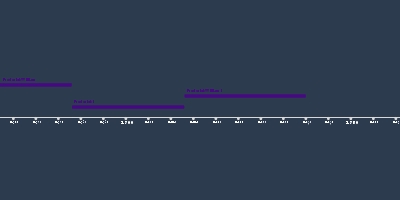British Reform (jan 1, 1815 – jan 1, 1871)
Description:
Britain also experienced a change in politics, but through gradual reform. 18th century Britain was remarkably stable, but it was hardly democratic (only about 8% was allowed to vote). Aristocrats controlled politics while common people had little civil rights.By the 1780s there was growing interest in political reform, but the French Revolution made Britain resistant to change. During the war years, Britain had been unable to import inexpensive grain, leading to high prices and large profits for the landed aristocracy. When the war was over, grain could be imported again, but with the Corn Laws, aristocrats were able to place high tariffs on imported grain that caused absurd prices for the working class.
The Tory government responded to unrest by temporarily suspending the traditional rights of peaceable assembly and habeas corpus (the right to a trial for a person under arrest). In 1819, over 60,000 lower-class citizens protested. 18 were killed and over 600 wounded by a government cavalry assault in the Peterloo Massacre. Parliament then passed the Six Acts, which placed controls on a heavily taxed press and practically eliminated all mass meetings.
British citizens then called for liberal reform, including a say in the government. In the 1820s the Tory government moved in the direction of better urban administration, greater economic liberalism, civil equality for Catholics, and limited imports of foreign grain, which encouraged the middle class to press on. With popular support, the Whigs then passed the Reform Bill of 1832, which favored the House of Commons and increased the right to vote. The conflicts were then resolved, temporarily.
Calls for more radical reform followed. The Chartist movement inspired demands for universal male suffrage, but Parliament rejected their pleas. Calls from the Anti-Corn Law League led to the laws being repealed in 1846. England therefore escaped famine after Ireland’s potato crop failed.
Later, Britain experienced a peaceful and successful political evolution. A two-party Parliament guided the country from classical liberalism to a democracy.
Whig leaders were hesitant with expansion of franchise. In 1859 the Whig Party merged with other groups to form the Liberal Party, which advocated social reform and laissez-faire economics. The Second Reform Bill of 1867 extended the right to vote to all middle-class males and the best-paid workers to broaden their base of support beyond the landowning class. “Lower orders” appeared to vote as responsibly as their “betters”. The Third Reform Bill of 1884, introduced by liberal Prime Minister William Gladstone, then granted the vote to almost every adult male. Queen Victoria’s reign offered the British a sense of pride and stability in an era of political change.
After a period of slight inactivity, the House of Lords tried to reassert themselves by ruling against labor unions and vetoing acts like the People’s Budget, which was to increase spending on social welfare services. They finally gave in and aristocratic conservatism slowly yielded to popular democracy.
Unlike before, a rush of extensive social welfare measures came. The People’s Budget was passed and raised taxes on the rich. It subsequently helped pay for numerous social measures (although refused female suffrage, which increased women’s demands for it).
Around the same time, the Irish Republican Brotherhood, or “Fenians”, engaged in violent campaigns against British rule. After responding with repression, the English slowly granted concessions. Some, like Gladstone, introduced bills to give Ireland home rule, but failed. Catholics and Protestants were split on self-government, as Protestants in Ulster, or Ulsterites, refused to live in a majority-Catholic Ireland. Ulsterites had raised armed volunteers and gained English support. A compromise bill from the House of Lords was rejected, and the conflict was put on halt by the first world war. The situation in Ireland demonstrated the power of nationalism, and how governments could not gain greater loyalty without strong national feeling.
Added to timeline:
Date:
jan 1, 1815
jan 1, 1871
~ 56 years
